Each month, a member of the Business Women’s Forum Steering Committee writes a guest article related to their experience and expertise as a woman in business. This month’s article was written by Alex Goeller, Director of Philanthropy at the Discovery Gateway Children’s Museum.
Are you a dynamic for-profit powerhouse with a passion for making a genuine impact in your community? If so, navigating the most effective ways to give back might be on your mind. In my decade-long career, mostly in the public sector, I’ve observed a crucial need for a revolutionary shift in how both for-profits and non-profit organizations view philanthropy. It’s not just about one-way contributions anymore; it’s about forging dynamic, collaborative partnerships that redefine the game.
The Multifaceted World of Corporate Social Responsibility (CSR)
Corporate social responsibility (CSR) has traditionally involved donating a portion of a for-profit’s revenue to a non-profit organization. While this kind of support remains essential, a well-rounded CSR program goes beyond monetary contributions. Environmental, ethical, philanthropic and financial initiatives intertwine to guide businesses in making a positive impact. Why is this important? Authentic CSR creates a positive public image, enhances consumer relationships and fosters a positive work environment.
The Impact on Employees and Consumers
Research from a 2017 study indicates that up to 78% of employees desire employer engagement in CSR initiatives. Employees at CSR-oriented organizations are twice as likely to rate their corporate culture as positive. This extends to factors such as paid volunteering time, opportunities to choose charities, matching gift programs and sustainability measures. Moreover, engaging in CSR can directly improve your company’s profit margins. According to Business.com, socially responsible practices can both reduce costs and increase customer traffic. When choosing between brands, 92% of Gen-Z, 90% of Millenial and 81% of Gen-X consumers stated that they would support a brand with a strong purpose. 87% of consumers even said they would buy a product because a company supported an issue they care about.
Aligning with Demographic Trends
Demographic trends, particularly the growth of younger generations in the workplace, suggest that CSR actions will be even more crucial for company brand and image in the coming years. Studies show that Gen Z and millennial employees have high expectations for both their employers and the organizations they support, making corporate initiatives even more important as the workforce ages.
Navigating the CSR Landscape
According to the Harvard Business School, an estimated 90 percent of companies on the S&P 500 index published a CSR report in 2021, up from 20 percent in 2011. Despite the general awareness and inclination of for-profit companies towards CSR, not all have a community engagement plan from the outset. The concept of CSR can seem overwhelming, but the good news is that there are varying levels of engagement and small entry points that make the process more digestible.
Starting Small and Getting Buy-In
Consider starting small, aligning with employee and consumer values. Explore early initiatives within HR or Marketing that can be positioned as unique employee benefits or strategies to invigorate your brand. Early buy-in is key, so engage your stakeholders early in the process. Conduct surveys with both customers and employees to discern their priorities and causes close to their hearts. This can be as simple as – What causes matter to you and how should our company support those causes? It’s not just about collaboration; it’s about making a meaningful impact where it matters most.
Selecting the Right Non-Profit Partner
Selecting the perfect non-profit collaborator is pivotal for a successful partnership. Factors like personal connections or experiences, a commitment to local impact and maintaining transparent communication with both clients and employees about their preferred causes should be at the forefront of your considerations. Personal connections could mean aligning your initiatives with the needs of your surrounding community.
For instance, if your organization operates in an area with a significant unsheltered population, explore initiatives supporting programs dedicated to serving that community. Similarly, if your business is situated near a polluted river, consider backing organizations focused on river clean-up efforts. Perhaps your initial CSR efforts will be environmentally focused. For example, if you are proud of being a local, Utah-based company, consider using products within your organization that are also locally produced. Align your efforts with the community’s needs, ensuring your initiatives are authentic, feasible and productive for both parties.
Building Lasting Partnerships
Establish a relationship with open communication. Learn about the non-profit’s true needs and align your support accordingly. Maybe they don’t need 100 volunteers to show up every other month, but they could really use 5 people a week to help sort donations. Take the time to ask. Be clear about your budget and the possible employee time you have. Take the time to initially set something up that will be feasible and productive for both parties. Avoid overextending. A lot of organizations engaging in CSR work might try to support several organizations at once – that approach can feel erratic and misaligned. By finding one or two causes that resonate with your employees and customers – you are already on a path of genuine, authentic engagement.
Types of Engagement
Once that initial relationship is established, again, there can be a more in-depth conversation about what type of support would be the most beneficial. There are various types of philanthropic programs that are higher commitment such as establishing a company foundation, matching company funds with employee donations, matching member or client contributions (there’s that buy-in again) or committing to donating a percentage of revenue each year. There are some initiatives that might not be as cost-heavy initially such as paying employees for limited volunteer time, supporting employees to serve on volunteer boards, supporting their advocacy efforts by writing letters to legislators, hosting events together with the non-profit partner or using your marketing reach to further their mission. Each effort furthers the reach of this non-profit and further solidifies a great, collaborative partnership. Local organizations such as Mark Miller Subaru, Zions Bank, Savage Companies and CHG Healthcare have done an exemplary job of setting up unique and effective community engagement programs that speak uniquely to the causes they support and are authentic to their brands.
Enhancing Non-Profit Engagement
Nonprofits can enhance their engagement with for-profit entities by considering the unique benefits these companies seek from partnerships and really thinking through why these for-profit organizations would want to engage with their non-profit. What is the non-profit able to offer? If the non-profit specializes in DEI, maybe they could provide DEI training to the for-profit. If they work with animals, maybe they could set up bringing in an office support dog once a week. Again, this needs to be a two-way conversation. Think outside the box. Understanding the motivations of potential partners, aligning values and missions, and tapping into resources beyond monetary contributions are key elements. Nonprofits should assess whether their vision aligns with that of the potential sponsor, whether they consider the partnership as a collaboration, and if the sponsor perceives it similarly. All parties should be doing research and asking each other questions to establish an effective relationship.
Elevating Local Causes
Numerous important causes in your local community are waiting to be elevated. By engaging, your employees will be happier, customers more loyal, and your impact on the community more genuine and authentic. Embrace CSR as a transformative journey toward making a meaningful difference where it matters most.
Alexx is a seasoned nonprofit professional who is currently working as the Director of Philanthropy at the Discovery Gateway Children’s Museum. She works with community partners to raise funds which will create unique and inviting exhibits that highlight donor organizations while effectively engaging a young audience. She has worked for healthcare nonprofits, government agencies, and, prior to her current role, she managed a corporate philanthropy program at a local Utah company. In 2018, she graduated with a Masters of Arts in Nonprofit Management and Global Community Leadership. In addition to early childhood STEAM education, Alexx also passionately volunteers in the areas of refugee resettlement, female empowerment, and animal welfare. In her free time, Alexx enjoys spending time hiking, backpacking, and camping outside with her husband, Leo, and their dog Betty White.
*Any reference obtained from this blog to a specific initiative, issue or topic does not constitute or imply an endorsement by the Salt Lake Chamber. The views and opinions expressed in this blog do not necessarily reflect those of the Salt Lake Chamber.



